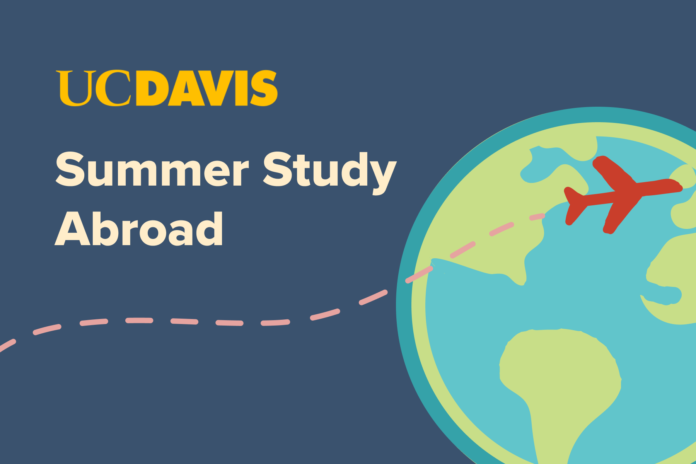Opportunities and advice for those seeking to learn more about the world around them without breaking the bank
By ZOEY MORTAZAVI — features@theaggie.org
Throughout the average college experience, students can often become overwhelmed by their courses and extracurriculars, sometimes losing sight of the kind of learning that cannot be achieved in a classroom: experience, discovery and exposure to different cultures and ways of life. According to many students in Davis, gaining experience and knowledge about lifestyles and cultures beyond our own small college town is crucially important.
Some of the most memorable experiences for UC Davis students come from taking trips with their friends over the summer. Many of these trips are centered around outdoor activities like skiing, hiking and exploring naturally beautiful parts of the world.
There are many opportunities where students can reach these locations with their friends, while still being able to work and earn money during the week, as well as explore at their leisure on the weekends. For example, seasonal positions at national parks across the country are always hiring college students for jobs ranging from 1-3 months in duration. These jobs typically entail a 20 to 30-hour work week with free weekends. They also often provide inexpensive housing for employees.
“I think it’s so important for the younger generation to take advantage of combined travel and work opportunities because it teaches them important life skills like responsibility, empathy and perseverance,” Mikaela Abella, a first-year marine biology major, said. “It’s a completely different environment and way of learning; it positively forces you to tap into these skills, which will really change the way you speak to others and view the world.”
There are many alternative ways for students to travel while keeping it somewhat affordable. Studying abroad is a very popular option, especially considering that UC Davis offers both educational and internship opportunities abroad.
A key component of student-based travel affordability is finding programs that operate during the school year so that any financial aid and scholarships can be applied to those programs. Information about UC Davis Study Abroad programs can be found through the Global Learning Hub, as well as on the UC Davis website.
“I think that traveling during college is really helpful in developing a more holistic worldview, especially if you’re staying in another country for a long time,” Olga Muys, a second-year history major, said. “You get the opportunity to see how people live and work outside the American cultural bubble. That’s something that’s really valuable when you’re a young person figuring out what sort of life you want to lead [and] what sort of values you want to hold for yourself.”
Additionally, there are many programs specifically tailored to fit the needs and schedules of college students. Some of these programs include CEA Study Abroad, as well as CIEE College Study Abroad, among many others. These programs offer a wide variety of scholarship opportunities for students and can be helpful with the planning process, informing students about what they should both expect and contribute in order to succeed while studying abroad.
However, for students looking to make money while still being able to travel during the summer months, there are options aside from working at a fast food restaurant in your hometown. At UC Davis and elsewhere, many are beginning to consider and take advantage of seasonal job opportunities.
“Landing a seasonal job isn’t just about extra income, though that’s certainly a cherry on top. It’s also about the rich, diverse experiences each role provides,” a FlexJobs article by Adrianne Bibby reads. “Every seasonal job places you in a new role and a different environment where you can hone your skills, tackle fresh challenges, and uncover new roles or duties to explore.”
Through websites such as CoolWorks and Aramark, you can apply to work — which often comes with housing options — for the summer in national parks, resorts and other locations. There are a variety of jobs and places, and it’s a way for students to travel during the summer while still making money. There are also many resources for these types of jobs through the California Department of Parks and Recreation.
“I think getting a seasonal job in a national park is a great opportunity for students to meet new people from all different types of backgrounds and learn new skills in a hands-on environment, as well as experience the beauty of nature in new places,” Nicole Mayer, a third-year economics major, said. “That’s something you really can’t get in a classroom.”
People at the college level are highly encouraged to consider these kinds of opportunities. So long as students have the time and flexibility to make these kinds of memorable experiences happen, there seems to be a great deal of benefits.
“The parks need seasonal workers, especially for the busy summer, which offers nature lovers an opportunity to immerse themselves affordably in a beautiful setting and earn some money to boot,” a Washington Post article by Sharon Waters reads.
Seasonal jobs can expose students to financial independence, grant them hands-on work and learning experience and expose them to various work industries. At the college level, studies show that exploring many different career paths can make students more well-rounded, as well as prepare them for the workforce.
Regardless of the method each student chooses, having the opportunity to gain new skills, getting away from your hometown and ordinary way of life, while still being paid and working while away from home, appears to be a rare and exciting opportunity. Seasonal employment can launch students into productive working environments, and allow them to be stationed in idyllic travel destinations while still helping them save money for their futures.
Written by: Zoey Mortazavi — features@theaggie.org




